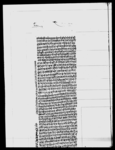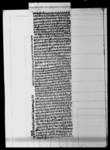A letter from Lakṣmaṇa Śarmā to Rājaguru Raṅganātha Pauḍyāla re activities involving the Mughal emperor and the British resident in Delhi (VS 1895)
ID: DNA_0003_0046
Edited and
translated by Simon Cubelic
in collaboration with
Rajan Khatiwoda, Raju Rimal
Created: 2017-08-29;
Last modified: 2019-10-30
For the metadata of the document, click here
The accompanying edition, translation/synopsis and/or commentary are available under the terms of the Creative Commons Attribution-ShareAlike 4.0 International License
Abstract
In this letter, Bhikṣu Lakṣmaṇa Śarmā reports to Rājaguru Raṅganātha Pauḍyāla on political activities in Delhi. The letter is divided into two parts. In the first part, events concerning the Mughal emperor Bahadur Shah Zafar are recounted, in particular his meeting with a fakir. The second part details financial matters relating to Indian nobles and involving the British resident Thomas Theophilus Metcalfe.Diplomatic edition
[1r-part1]
॥श्री॥⟪1नं2२७९⟫
[1r-part2]
1स्वस्तिश्रीसर्वोपमायोग्यव्रह्मकर्म्मसमर्थश्रीश्रीश्रीश्रीश्रीश्री2राजगुरुपण्डितराजरंगनाथपण्डितानां चरणसरोरुहेषुभि
3क्षुकस्यलक्ष्मणशर्मणःप्रणामाःसंतु•ञाहाकुशल्•ताहा
4कुशलभयाहाम्रोउद्धार्होला•आगेञाहाकोसमाचारभलोछ•
5उप्रांत•आषाढवदि९रोज७मावात्साहमोतिमहल्माहुनुहुंथ्यो
6वलीअहीदआयामोजरागर्या•वलीअहीदलाईतालकटौराना
7मगर्याकोवाग्वक्सनुभयो•वलीअहीदलेअसर्फि१नजर्दिस
8लामगर्या•ताँहापछिवात्साहलेमुगलवेगषांवजीरलाइहुकुं
9भयो•मैलेसुन्याअलषत्वेगषाँकपतानले•वहुत्कदिमिसिपाहि
10हरूलाइषारिज्गर्योअरे•तँभनिदियास्कोहिगरिप्लाइ
11षारिज्नगरोस्•आषाढवदि१२रोज३मावात्साहपोसाकअ
12लंकरणआफ्नालगाइवैह्राउनुभयो•मिर्जावलीअहीदकि
13ल्लेदारहोलसंसाहेव•अरुदुइसाहेव•सर्दारहरूमोजरा
14गरि•वात्साहकापाउरषुवारिगया•षानंकावजारमामुल्ला
15साहनाउगर्याकाफकीरवस्याकाजगामाजाइफकीरसि
16तभेटगरि•वाँहिवात्साहलेकौव़ालकोगाउनुसुन्या•रो
17क्सत्हुँदामारुपयाभर्याकोजरीकोथैलिफकीरलाइच
18ह्राउनुभयो•फकीरलेपनिपगडि१व़ोलाकोसेर्निवात्साह
19लाइदिविदागर्या•वात्साहआउदाजाँदामाकंपनिकातर
20फ्वाट२१।२१पटक्तोपकाअवाज्भया•नवाफवजीर
21मम्मत्षाँकोषलितालि•तामससाहेवकाकोठीमाज्ञानचंसेठ्
22कागुमास्ताआयो•मम्मत्षाँकोपत्रसाहेवलाइदियो•पचासह
23जाररूपयामम्मत्षाँलेज्ञानचंसेठ्काकर्जालियाकाछं•त्यस्माकं
24पनिवाटवाह्रहजारपांचसयमम्मत्षाँलाइजोरूपयादर्माह
25मिल्छसोज्ञानचंसेठ्लाइमिलोस्•तिकुरासुनिपत्रहेरि•तामस
26साहेवले•उत्तरालेष्या•यसकाममाअजमेरकारजीदण्डकोमा
27र्फत्तम्रोपत्रनआउंज्याल्कसैलाइ१कौडिपनिदिन्याछैन•
28आषाढवदि१२रोज३कारातमाषानपिनगरितामससाहेवगुड्गा
29उगया•राजाहरूकावकीलहरू•तामससाहेवसितगया•केहि
30दिनताँहावसिआउन्य़ाकुरासुनिंछन्•वुधवाररविसेनसिक
31न्तरसाहेवलेसंशुद्दिषांनवाफ्कातनुषाहदारलाईपचिसह
32जाररूपयाकोठिवाटदिया•हिंदुराउमर्हट्टाकोमैन्हा५को
33दर्माहपचासहजाररूपयाःमहाराजजनकुराउग्वालिय
33रकामालिकलेतामससाहेवमार्फत्पठाइदिया•तामससा
34हेवलेहिंदुराउलाइदिया•लषनौकामालिकनसिरदौला
35उठ्नवस्नसक्तैनन्•पलंगमाजनानाषांमापडिरहछं•क
36चहरिपनिताँहिहुंछ•उंलेसर्कारकंपनिलाइलेषिरा
37ख्याछं•पचिसलाषरूपयामनजरआनाचह्राउछुमेरो
38जिउछंदै•मेराछोरालाइगादिमावसाइदिनुहव़स्•मेरो
39मुलुकसर्कारमाइजारागरिदिंछु•भन्याइकुरापनिसुनिं
40छन्•जयपूरकाराउल वैरिसालकाछोरालाइ•महा
41रानिवाटतम्रावावुकोकामतिमिगरभन्याहुकुंभैरहेछ
42भन्याकुरोसुनिंछ•करुणानिधान•इसवैकुरासुन्याका
43लेषिंछन्हुन्होयिनन्योठहराउनसकिदैनमाफग
44राईवक्स्याजाला•मअज्ञानिछु•किमधिकंविज्ञातितरे
45षुइतिसम्वत्१८९५सालमितिआषाढशुदिरोज
46मुकामदिल्लीशुभम्¯¯¯¯¯¯¯¯¯¯¯¯¯¯¯¯¯¯1यससमेतसातआठफेरापत्रचह्राइपठायाकाभया•पुग्छंकिविचमाअट्कछं•वुझ्नसकिएन•1लाहुरदेषि३०कोशफिरोजवादमामेरट्कोछाउनिजांछभनि
2सुनिंछ
Translation
[1r]
No. 2791
Hail! Greetings from Bhikṣu Lakṣmaṇa Śarmā to the lotus feet of the sixfold venerable RājaguruPaṇḍitarājaRaṅganātha Paṇḍita, who is worthy [to be an object] of all [exalted] similes, and who is capable of performing the duties of a Brahmin. Here [we] are fine. If [you] are fine there, we may prosper. To start with (āge), the tidings here are good.
Uprānta: On Saturday, the 9th of the dark fortnight of Āṣāḍha, the emperor2 was in the Palace of Pearls (Moti Mahal)3 . The crown prince (valī ahīda)4 came and paid obeisance (mojarā)5 to him. [The emperor] granted the crown prince a garden called Talkatora6 . The crown prince gave him 1 gold coin as an honorary gift (najara) and saluted him. After that the emperor gave to his vizier, Mugal Vega Kāṃ, the [following] order: “I heard that Captain Alakhat Vega Khā̃ has dismissed many old soldiers. Tell him that he should not dismiss any poor ones.” On Tuesday, the 12th of the dark fortnight of Āṣāḍha, the emperor set off on an outing wearing his attire and ornaments. The crown prince (mirjā valī ahīda), the KillādāraHolasaṃ7 sāheba and two other sāhebas as sardāras8 escorted him, [thereby] paying obeisance [to him]. [The emperor] went to the Khānaṃ-kā Bazar9 to the place where a fakir called Mullā Sāha lives. There he met the fakir and listened to qawwali singing. Before leaving10 he offered the fakir a purse made of silk brocade (jarī) filled with money. In return, the fakir gave the emperor 1 turban and a sugar ball (volā)11 sweetmeat (serni)12 and saw him off. Each time on the emperor’s arrival and departure, there was the sound of 21 canon firings13 from the Company.
A representative of Jñānacaṃ Seṭh came to the residental house (koṭhī)14 of Thomas15 sāheba bringing a kharitā from Navāpha Vizier Mammat Khā̃. He handed over the letter from Mammat Khā̃ to the sāheba. Mammat Khā̃ has taken a loan of fifty thousand rupees from Jñānacaṃ Seṭh. In this matter, the salary of twelve thousand five hundred rupees Mammat Khā̃ receives from the Company is to go [directly] to Jñānacaṃ Seṭh. Having heard this and having looked at the letter, Thomas sāheba wrote the [following] reply: "Regarding this, as long as your letter does not come through the resident of Ajmer, I will not give even a single cowry to anyone." In the evening of Tuesday, the 12th of the dark fortnight of Āṣāḍha Thomas sāheba went to Gurgaon after dinner (khānapina). The envoys of the kings went together with Thomas sāheba. It is heard that they will stay there for some days and [then] return. On Wednesday, twenty-five thousand rupees from the residential house were given by Ravi Sena Sikandarasāheba to a salary holder (tanukhāhadāra) of Navāpha Saṃśuddhi Khā̃. Mahārāja Janaku Rāu16 , the lord of Gwalior, sent the salary of fifty thousand rupees for 5 months to Hindu Rāu Marhaṭṭā17 through Thomas sāheba. Thomas sāheba handed it over to Hindu Rāu. Nasira Daulā, the lord of Lucknow, is not able to stand or sit. He is [always] in bed leaning against Lady Khā̃. Court sessions, too, take place there. It is also heard that he wrote to the [Company] Government [the following]: “I will offer you an honorary gift (najarānā) of 25 lakh rupees. Enthrone my son while I am still alive. I will give my realm in lease (ijārā) to the Company Government.” It is heard that the Mahārānī gave to the son of Rāula Vairisāla of Jaipur [the following] order: "Assume the duties of your father.”
O treasure store of compassion! I have written everything that I heard, [but] it cannot be ascertained whether it is [true] or not. [You] will perhaps forgive [me]. I am ignorant. What more [to say] to one who exceeds [others] in knowledge? On [...]day, the [...]18 of the bright fortnight of Āṣāḍha in the [Vikrama] era year 1895 (1838 CE). Residence: Delhi. Auspiciousness
Including this [letter], I have sent letters seven or eight times. I was not able to determine whether they reached you (lit. there) or got stuck on the way.19
It is heard that the garrison in Meerut is moving to Firozabad, 30 kośas from Lahore.20
Commentary
An edition of this document is published in Ancient Nepal vol. 26 (January 1974), p. 19.


